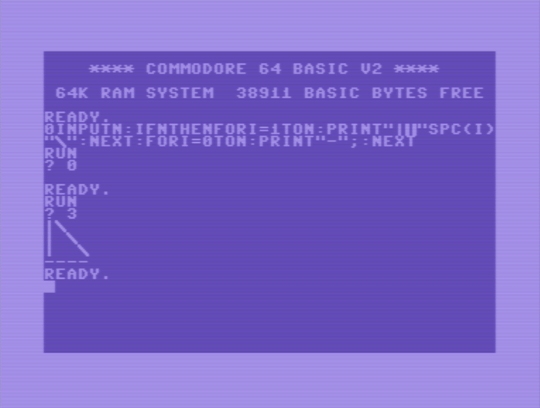30
5
Your task is to write a program or a function that prints an ASCII triangle. They look like this:
|\
| \
| \
----
Your program will take a single numeric input n, with the constraints 0 <= n <= 1000. The above triangle had a value of n=3.
The ASCII triangle will have n backslashes (\) and vertical bars (|), n+1 lines and dashes (-), and each line will have an amount of spaces equal to the line number (0-based, ie first line is line 0) besides the ultimate line.
Examples:
Input:
4
Output:
|\
| \
| \
| \
-----
Input:
0
Output:
In this test case, the output must be empty. No whitespace.
Input:
1
Output:
|\
--
Input & output must be exactly how I specified.
This is code-golf, so aim for the shortest code possible!

related – Rod – 2017-02-08T14:53:48.457
4Does it need to be a program or can it be a function? – fəˈnɛtɪk – 2017-02-08T15:04:15.223
8I think it would be better if case
0can have any unexpected output since it is an edge case (especially since you requested that the number of dashes must be one more than the input number) – user41805 – 2017-02-08T15:10:06.103FYI: You can use
<pre><br></pre>to have an empty code block (so you don't need an(empty)– Nathan Merrill – 2017-02-08T15:31:56.580@TuukkaX as I said, output must be exactly as specified. – Okx – 2017-02-08T15:48:11.380
@LliwTelracs you can see in the top that I said a program. – Okx – 2017-02-08T15:49:37.137
4@Okx There are frequently questions where the asker says program but really meant program or function. You might want to clarify that you are asking for a FULL program – fəˈnɛtɪk – 2017-02-08T16:04:08.933
@LliwTelracs changed. Do you think I should allow functions? – Okx – 2017-02-08T16:17:59.710
@Okx I feel it is your choice but would prefer that there wasn't the additional restriction. – fəˈnɛtɪk – 2017-02-08T16:19:10.883
9I would definitely go for both program and function. That's the default rule if nothing else is specified. I would also remove the 0-edge case since it's a direct violation of "n+1 lines and dashes (-)". – Stewie Griffin – 2017-02-08T17:48:13.173
3The challenge would be too simple without the size=0 exception. Part of the challenge is figuring out a way to account for this with the least amount of extra code. – 12Me21 – 2017-02-08T18:25:07.563
1I second @12Me12 - even if not intended, the edge case gives an... edge to the challenge. And changing challenges posted after answers are submitted is bad form. – Mindwin – 2017-02-08T19:04:29.917
@StewieGriffin a single dash wouldn't be a triangle, would it? :P – Okx – 2017-02-08T19:05:41.437
Is it acceptable to return the string? Or is printing mandatory? Quite a few answers here (including mine) are returning a string to save a few bytes. – adrianmp – 2017-02-09T07:43:52.507
1@adrianmp Since people have been doing both, I'd say you can return the string – Okx – 2017-02-09T10:43:38.800
1I assume that PETSCII substitutes for the ASCII characters are okay if it's for a C64/PET/VIC-20 etc...? – Shaun Bebbers – 2017-02-10T16:20:17.957
My original idea for suppressing output for
x = 0was originallyx and x+1but apparently that's not very efficient... – HyperNeutrino – 2017-03-05T02:46:14.637